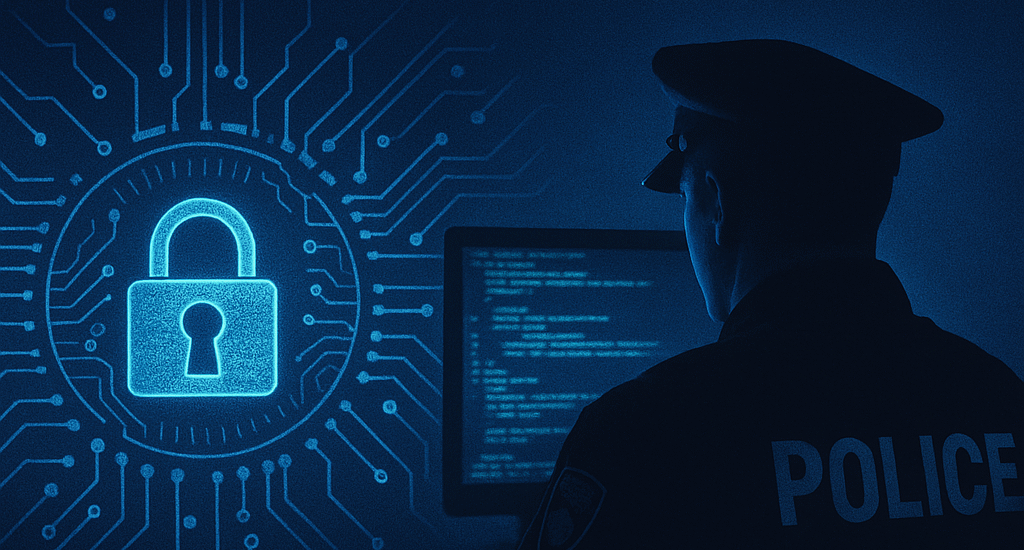



Author: Shivani Singh
Institution: Amity University Patna
ABSTRACT
The Bharatiya Nyaya Sanhita (BNS) 2023, enacted to replace the colonial-era Indian Penal Code of 1860, introduces a contemporary legal structure aimed at addressing modern crimes, including cyber offences. This paper critically examines the efficacy of the BNS (Bharatiya Nyaya Sanhita)2023 in combating cybercrime and facilitating digital policing. It explores the law’s specific provisions related to online fraud, cyberstalking, digital impersonation, and electronic evidence, assessing their relevance and enforceability in today’s digital landscape. The study also evaluates the integration of digital policing methods such as remote FIR filing, digital forensics, and cyber investigation protocols under the new legal framework. While the BNS (Bharatiya Nyaya Sanhita)marks a significant shift towards recognizing and penalizing technology-enabled crimes, challenges remain in terms of infrastructure, training, inter-agency coordination, and legal harmonization with existing statutes like the IT Act and Digital Personal Data Protection Act. The paper concludes that the BNS (Bharatiya Nyaya Sanhita)2023 offers a strong foundation for cybercrime regulation, but its effectiveness will depend on robust implementation, capacity building, and continuous legal modernization.
Introduction
In an era where cyber threats are becoming increasingly complex and far-reaching, India has taken a significant legislative step by enacting the Bharatiya Nyaya Sanhita (BNS), 2023. This new criminal code, which replaces the colonial-era Indian Penal Code (IPC) of 1860, marks a major transformation in the country’s approach to criminal law. Among its many features, the BNS pays special attention to the need for digital policing, making it one of the most forward-looking legal reforms in recent Indian history.
Evaluating the efficacy of BNS ( Bharatiya Nyaya Sanhita)2023 in addressing cybercrime and digital policing involves analyzing its provisions, structure, and implementation feasibility. Cyber Crime, An expanding threat, the digitalization of finance, Communication, governance, and commerce has opened new avenues for criminal activity such as: Online fraud and identity theft, Cyberbullying and stalking, data breaches and hacking, Ransomware attacks, Child pornography and trafficking through dark web platforms. These crimes often exploit the anonymity and borderless nature of cyberspace, posing challenges to law enforcement agencies operating under outdated legal frameworks.
The BNS, 2023 Addresses Cyber Crime
The Bharatiya Nyaya Sanhita(BNS) introduces several critical changes aimed at dealing with the growing menace of Cybercrime:
Digital Policing: A modern Law enforcement approach to complement its new cybercrime framework, the BNS emphasizes digital Policing- the integration of technology into investigation, evidence collection, and criminal procedures.
Case1: Suhas Katti V. Tamil Nadu (2004): In the case Suhas Katti V. State of Tamil Nadu remains a cornerstone of Indian Cyber-law. It demonstrates early judicial activism in recognizing and prosecuting online wrongdoing, setting jurisprudential and procedural benchmarks. It not only penalized cyber-defamation and forgery but also firmly established the legitimacy of electronic records in Court paving the way for modern cyber-jurisprudence in India.
No direct post BNS (Bharatiya Nyaya Sanhita)2023 judgments yet, but pre-existing case law under IT Act (Information Technology Act) and Section 65B informs current standards.
Gaps and ongoing challenges: while BNS (Bharatiya Nyaya Sanhita)adds cyber-specific grounds critics argued its provisions are not granular enough to handle fast evolving like ransomware, AI facilitated fraud, data breach etc.
Challenges and Limitations Despite its ambitious framework, the implementation of digital policing under the BNS faces several hurdles:
Infrastructure Gaps: Many states still lack sufficient forensic labs and trained cybercrime personnel.
Privacy Concerns: Enhanced surveillance powers may risk misuse if not properly regulated.
Legal Ambiguity: Some definitions in the Bharatiya Nyaya Sanhita (BNS), such as “terrorist activity” or “organized crime,” remain vague in the digital context.
Digital Literacy: Both law enforcement officers and the public need greater digital awareness to fully benefit from the new provisions.
Recommendations for Better Efficacy
Capacity Building: Train police officers in cyber forensics and digital crime investigation.
Public Awareness: Cyber hygiene education programs, especially in schools and rural areas.
Judicial Training: Equip judges and prosecutors to handle digital evidence and cyber cases.
Tech –police partnership: Collaborate with tech companies for faster traceability of crimes.
Related Article You Must Like
Cybersecurity and Data Privacy Laws
Critical Analysis: Efficacy of BNS 2023
Aspect Strengths Gaps, Legal framework specific provisions for cyber offenses; integrated with digital laws need clearer coordination with IT Act (Information Technology Act) and data protection laws, digital evidence legal recognition; supports online procedures enforcement requires advanced infrastructure, policing supports digital policing tools and methods , state-level disparity in readiness; lack of national-level coordination, victim protection stronger provisions against online abuse and harassment implementation in rural areas remains weak.
Cyber Crime in India, such as Cyber fraud and scams, identity theft and phishing, cyberstalking and harassment, data breaches and ransomware, deep fakes, misinformation, and cyberterrorism, the older IPC (Indian Penal Code) was not designed to handle such technologically sophisticated crimes effectively.
Key provisions on Cyber Crime under Bharatiya Nyaya Sanhita (BNS) 2023
The Bharatiya Nyaya Sanhita (BNS) 2023 introduces specific provisions and amendments that directly address digital offenses:
Digital Policing: Potential Improvements
The Bharatiya Nyaya Sanhita (BNS) 2023 promotes digital policing, which refers to law enforcement using digital tools to detect, prevent, and investigate crime:
Potential benefits: Speed and efficiency in harm in handling cybercrimes, standardization of procedures across states, better integration with other laws (e.g., Data Protection Act 2023, IT Act), Clear jurisdiction in cyberspace cases.
Challenges to implementation: Lack of cyber policing infrastructure in many states, Shortage of trained personnel in cyber forensics, jurisdictional overlaps between BNS (Bharatiya Nyaya Sanhita) and IT Act provisions, Potential risks to privacy and misuse of surveillance powers
Conclusion
The Bharatiya Nyaya Sanhita (BNS)2023 represents a significant step forward in India’s efforts to modernize its criminal justice system, particularly in the realm of cybercrime and digital policing. By explicitly recognizing cyber offences and integrating digital procedures within the legal frameworks, the BNS attempts to address the pressing need for laws that reflect the realities of the digital age. Its provisions provide a more structured legal response to cyber fraud, online harassment, and the misuse of digital platforms, while also promoting the use of technology in investigation and law enforcement.
The Bharatiya Nyaya Sanhita (BNS) 2023 is a progressive step toward handling cybercrime and enabling digital Policing in India. Its success, however, depends on implementation, infrastructure, and inter-agency coordination. While the law sets a strong foundation, practical and systemic reforms are needed to fully realize its potential in the digital age.
However, the law’s success in combating cybercrime will ultimately depend on its implementation. Persistent challenges such as inadequate cyber infrastructure, lack of skilled personnel, inconsistent state-level preparedness, and the need for synchronization with other digital laws must be addressed. Moreover, the protection of individual rights and privacy in the face of expanded digital policing capabilities requires careful legal and ethical balancing.
In conclusion, while the BNS (Bharatiya Nyaya Sanhita)2023 lays a robust legislative foundation for tackling cybercrime and enabling digital policing, its efficacy will hinge on sustained investment in capacity building, institutional reform, public awareness, and inter-agency collaboration. Only through such holistic effects can the vision of a secure and digitally resilient justice system be realized.